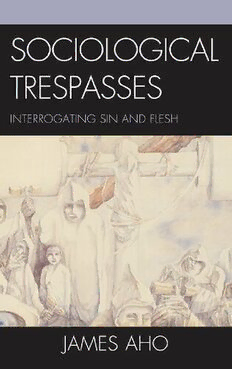
Sociological Trespasses: Interrogating Sin and Flesh PDF
Preview Sociological Trespasses: Interrogating Sin and Flesh
Sociological Trespasses Sociological Trespasses Interrogating Sin and Flesh James Aho LEXINGTON BOOKS Lanham • Boulder • New York • Toronto • Plymouth, UK Published by Lexington Books A wholly owned subsidiary of The Rowman & Littlefield Publishing Group, Inc. 4501 Forbes Boulevard, Suite 200, Lanham, Maryland 20706 www.lexingtonbooks.com Estover Road, Plymouth PL6 7PY, United Kingdom Copyright © 2011 by Lexington Books All rights reserved. No part of this book may be reproduced in any form or by any electronic or mechanical means, including information storage and retrieval systems, without written permission from the publisher, except by a reviewer who may quote passages in a review. British Library Cataloguing in Publication Information Available Library of Congress Cataloging-in-Publication Data Aho, James Alfred, 1942– Sociological trespasses : interrogating sin and flesh / James Aho. p. cm. Includes bibliographical references and index. ISBN 978-0-7391-6462-4 (alk. paper) — ISBN 978-0-7391-6464-8 (electronic) 1. Hostility (Psychology) 2. Human body—Social aspects. 3. Mind and body. 4. Common fallacies. 5. Social psychology. I. Title. BF575.H6A36 2011 301—dc22 2010052547 The paper used in this publication meets the minimum requirements of American National Standard for Information Sciences—Permanence of Paper for Printed Library Materials, ANSI/NISO Z39.48-1992. Printed in the United States of America Contents Preface vii 1 Hope 1 I:Sin 15 2 Inflation 17 3 Diabolization 35 4 Hurry 49 5 Greed 63 II:Flesh 77 6 MouthsandGenitals 79 7 Habitat 95 8 Health 111 9 TheLived-Self 125 10 TheHiddenSelf 139 References 147 Index 155 AbouttheAuthor 161 v Preface Unlessweprefertobemadefoolsofbyourillusions,weshall,bycarefullyanalyz- ingeveryfascination,extractfromitaportionofourownpersonality,likeaquintes- sence, and slowly come to recognize that we meet ourselves time and again in a thousanddisguisesonthepathoflife. —CarlJung(1969) Sociology can and has been directed to virtually every occasion of human concern:gender,poverty,race,sexuality,lawandmorality,propheticrevela- tion,andevengenius,tonamejustafew.SociologicalTrespassesaddresses the handful of issues that have commanded my attention throughout a four- decadescareerasanacademic: • Whatisthesignificanceofracial,ethnic,and/ornationalidentity? • Why do people of good conscience organize themselves to murder and rapetheirfellows? • Why is it that we are always running out of time, yet seem to have “too muchofit”onourhands? • Whatdrivespeopletoamasspilesofconsideredgoods? • Whydoweundertakethejointpolicingofourbodyopeningsandthoseof others? • Whatistheoccasionofenvironmentalcatastrophe? • What is the significance of pursuing health and immortality through bio- medicine? • Who,what,where,andhowisthisself,really? • Whatisheroism? My position is that each of these concerns arises from and loops back to reaffirm certain widely shared misbeliefs. These in turn are traceable to a vii viii Preface basic ur-illusion, so to say, an axiological conviction that there is a thing or things“outthere”independentofmethatcanvariouslycompleteme,secure me, fill me, stabilize me, or in some other way enable me to escape from or deny my “void,” my existential vacuity and precariousness, or if the reader prefers,myowndying. It is my own inner quaking that lies behind the search for a We “out there”withwhichtoaffiliate:anation,religion,orracebiggerthanmethatI canmergewith,andinbeingmergedescapemynakednessandfragility. This also explains the obsessive hunt for a Them out there, a person or groupthatconstitutesathreattothatWe(whichistosay,ineffect,aperilto my own existence). By taking up cudgels to fight this demonic other, this exemplar of nothingness, I can delude myself into thinking that I have con- quereddeath. The same idea also applies to strange ideas and weird music, to alien foodsand“addictive”intoxicants,andespeciallytospeakersof“bar-bar,”as they were known to the ancient Greeks: barbarians out there. By erecting wood, mud, concrete, and/or electronic walls against such objects, I am granteddelusivesecurity. Likewise,timeoutthere:anever-endingmotilitythatcan,asitissaid,be “savedup,”“bought,”“sold,”or“wasted.”Havingconvincedeachotherthat timecanbemanagedlikewaterresourcesandfirtrees,wedeceiveourselves intobelievingthatwearesomehowfixedandstable. So, too, that eminently magical stuff known as money out there: cowrie shells,beaverskins,slips of inscribedpaper, or tiny numerical icons skitter- ing across my computer screen. By amassing more and more of it I fill the emptinesslyingatthecoreofmybeing. Thisisalsotheimportofanenvironmentoutthere.Withanenvironment Ihavesomethingconcreteandsubstantialtoworkagainstandtransformafter myownimageandlikeness,andinsodoingconcretizemyself,makemyself tangible. Stillagain,thereistheillusionthathealthandwholenessareattainableby meansofaremedyoutthere—acosmeticsurgeryorarejuvenatingelixir—a thingthatcanputoffforeverthefactthatatthisverymomentIamonestep closertomyownend. Alongwiththeseisthechimeraofapersonalyouorananonymouspublic outthere,asignificantotherwhoseacknowledgmentandapprovalcanassure meonceandforallthatmyexistenceisnotadream;thatIamtrulyhere. Finally,thereistheideathatifIcanperformonemagnificentdeedinany of these arenas out there—defeat an enemy, accrue unsurpassed wealth, do six things at once instead of just two, ascend that last mountain, discover a cure for cancer, or simply attain fame by being the last survivor on a TV reality show (or, for that matter, simply be on one), then I can claim, “I am somebody!” Preface ix My argument is that our unexamined faith in these redemptive idols drives usto engage the world in destructiveways,frustratingour intentions, hurtingourselvesandothers.Thisbeingthecase,thetaskforsociologyisto explodetheur-illusion;nottodenytheexistenceofareality“outthere,”but to undermine belief that whateverit iscansomehow assuageour hunger for securityandcompleteness.Icallthistheactofsociologicaldestruction,orif the reader prefers the softer variation, deconstruction: down-building the scaffoldingofdeceptionsuponwhichwehaveerectedourlives.Butdestruc- tion is merely the first step. The second involves reconstruction. By this I meantheactofreclamation:reappropriatingbacktoourselveswhatwehave projected or transferred onto nations, enemies, time, the environment, mon- ey, and soforth. Another word forthisisrepossession.The ultimate goal of sociology is to repossess what we have been too eager to give away, re- nounce, or simply forget. Instead of evacuating our interiority, abandoning ourselvesinthingsoutthere,sociologycallsforareturntoourselves. I understand that this conception of sociology barely comports, if it does at all, to what passes by that title in today’s university. And it appears that this is likely to be even truer tomorrow as this same university gears up (or dumbs down, depending on one’s perspective) to compete for prestige and richesontheglobalstage.Whereishismethodology,itmightbeasked?his theoretical presuppositions? his empirical data? Above all, where is his pro- gramofsocialreform? Admittedly, my first inclination when faced with these questions is to hedge; to deal with them by indirection and obfuscation; to hide behind convoluted sentences and impersonal voicing, as I’ve seen other timid souls do. After all, who but a masochist would seek out the rebuke likely to be inflictedbyhiscolleagueswhenthelatter’ssuspicionsareconfirmed:Hehas none!Butlookingbackonmyteachingexperience,ithasbecomecleartome that what distinguishes sociology is not so much a methodology, a body of facts,asetpolicy,orevenatheory.Itisinsteadaformofartfulpractice.One thatfirstdestabilizes(“trespasses”)taken-for-grantedtruthsabouttheworld, and then plays in the resulting space. Thus instead of issuing a set of proto- cols which, if followed, promise to generate objective truths, I follow the recommendations of Paul Feyerabend, who advocates the anarchic metho- dology of “anything goes” (Feyerabend 1993, 19). In place of unassailable facts, I write about findings and suggestions. And in lieu of a systematic theory, I outline a standpoint. Finally, rather than announcing a program of social reform, I advocate personal work: disciplined reflection on what our motivesareforgoingtowar,goingtowork,goingtothedoctor,orjustgoing fasterandfaster.Inotherwords,insteadofcallingforreformoftheexterior world, of rectifying society so that I can fool myself one more time into thinking that I am correct; that I, at least, am a man of ethics and scruples; thatIamokayevenifyouarenot,Iproposetransformation“inhere,”active
